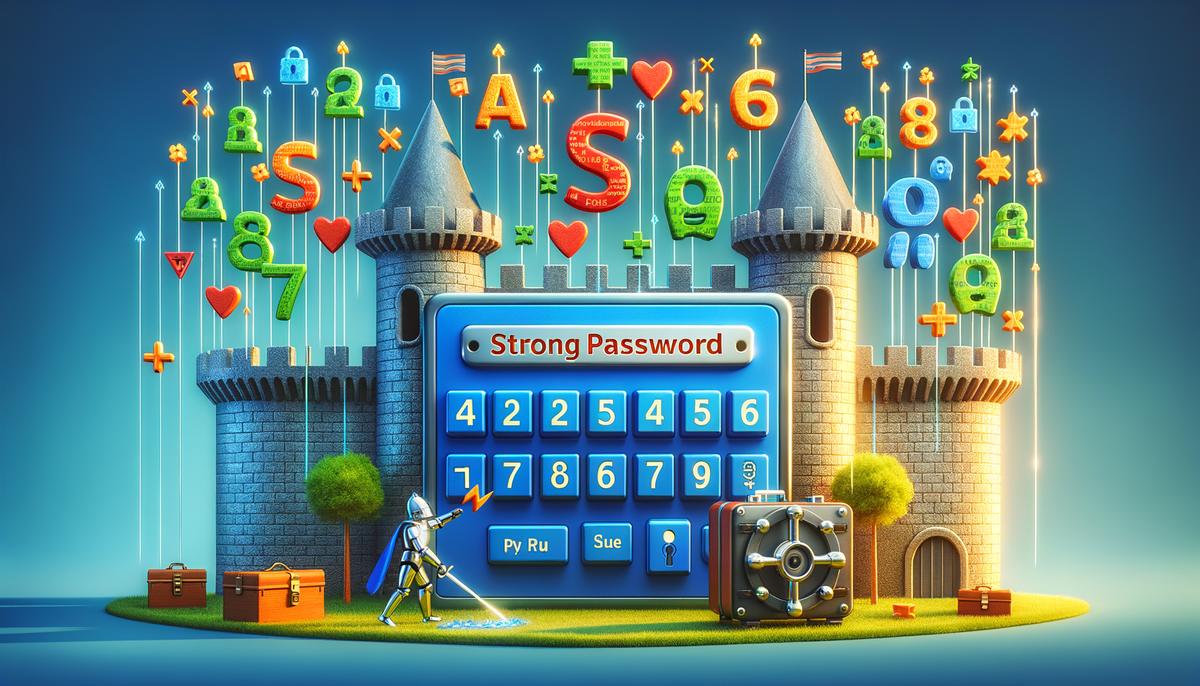How to Choose a Strong Password: A Simple Guide for Beginners
Protect your online accounts with strong passwords! Learn how to create unique, memorable passwords that are hard to crack, including tips on using password managers and two-factor authentication. Keep your information safe and secure - start now!

In today's digital world, it's more important than ever to keep your online accounts safe. One of the easiest ways to do this is by choosing a strong password. But what makes a password strong, and how do you create one? This guide will explain everything you need to know in a simple way, even if you're not a tech expert.
Why Strong Passwords Matter
Imagine your online accounts are like your homes. You lock your doors to keep strangers out, right? A strong password is like a strong lock. It makes it harder for bad guys, called hackers, to sneak into your accounts and steal your information.
Hackers are always looking for ways to get into your accounts, and easy passwords are like open doors! They can use these passwords to steal your money, your identity, and even your pictures and messages.
What Makes a Strong Password?
Think of a strong password as a secret code that only you know. It should be:
- Long: Like a long, winding path that's hard to follow. At least 12 characters is ideal.
- Mixed Up: Imagine letters, numbers, and symbols mixed together like ingredients in a delicious cake. This makes it harder to guess.
- Unique: Just like you have a unique fingerprint, your password should be different from any other password you use.
- Random: Don't use words from the dictionary or names. Make it sound like gibberish to others.
How to Create a Strong Password: Step-by-Step
Here's a simple way to create a strong password:
-
Start with a Phrase: Choose a sentence or phrase you can easily remember, like "I love my fluffy dog."
-
Make it Mixed Up: Replace some letters with numbers or symbols. For example:
- "I" becomes "1"
- "O" becomes "0"
- "L" becomes "!"
-
Add Some Randomness: Add random numbers and symbols to the end of your phrase. For example:
- "1 love my fluffy dog" becomes "1l0v3myfluffyD0g!@#$%23"
-
Avoid Common Mistakes:
- No Personal Info: Don't use your name, birthday, or phone number.
- No Easy Words: Don't use words like "password" or "12345."
Password Managers: Your Secret Weapon
Imagine having a safe where you can store all your strong passwords. A password manager is like that safe. It can help you generate strong passwords and remember them for you.
How it works:
- Pick a Manager: There are many password managers like LastPass, 1Password, or Dashlane.
- Generate Strong Passwords: The manager can create strong, random passwords for you.
- Store Your Passwords: The manager remembers all your passwords so you only have to remember one master password to unlock your safe.
Two-Factor Authentication: Extra Security
Even with a strong password, you can add an extra layer of protection called two-factor authentication (2FA). It's like having a second lock on your door.
How it works:
- Enable 2FA: Many websites and apps have a 2FA setting.
- Choose a Method: You can use a special app on your phone or get a code sent to your phone number.
- Use the Code: Whenever you log in, you'll need your password and the code from your phone.
Common Questions Answered
- How can this help me? Choosing strong passwords and using password managers keeps your information safe from hackers.
- What can I do to make my accounts more secure? Follow the steps in this guide to create strong passwords, use a password manager, and enable 2FA.
- What is the best way to manage my passwords? Use a reliable password manager like LastPass, 1Password, or Dashlane.
- Why is it important to use different passwords for different accounts? Using the same password for multiple accounts is like using the same key to unlock all your doors. If one key is lost, they can unlock all your doors.
Wrap Up: Keep Your Information Safe!
Choosing a strong password is like building a strong wall around your online life. It keeps bad guys out and protects your personal information. Remember:
- Use long, mixed-up, unique, and random passwords.
- Consider using a password manager.
- Enable two-factor authentication wherever possible.
By taking these simple steps, you can keep your online accounts safe and secure. Happy and safe browsing!




